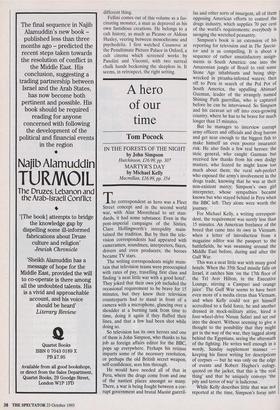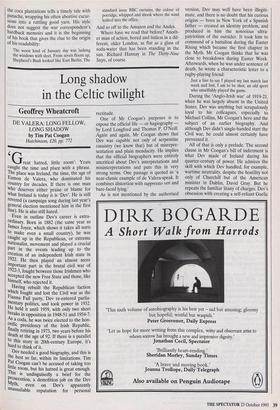A hero of our time
Tom Pocock
The correspondent as hero was a Fleet Street concept and in the second world war, with Alan Moorehead to set stan- dards, it had some substance. Even in the post-imperial campaigns of the Sixties, Clare Hollingworth's intrepidity main- tained the tradition. But by then the tele- vision correspondents had appeared with cameramen, soundmen, interpreters, fixers, drivers and even producers; the heroes became TV stars.
The writing correspondents might main- tain that television teams were preoccupied with rates of pay, travelling first class and finding 'a neat little war with a good hotel'. They joked that their own job included the occasional requirement to be brave for 15 minutes, but they knew their television counterparts had to stand in front of a camera with a microphone, glancing over a shoulder at a burning tank from time to time, doing it again if they fluffed their lines, and that a few had been shot while doing so.
So television has its own heroes and one of them is John Simpson, who thanks to his job as foreign affairs editor for the BBC, pops up everywhere. Perhaps his retinue imparts some of the necessary resolution, or perhaps the old British secret weapon, self-confidence, sees him through.
He would have needed all of that in Peru, where the drugs come from and one of the nastiest places amongst so many. There, a war is being fought between a cor- rupt government and brutal Maoist guerril- las and other sorts of insurgent, all of them opposing American efforts to control the drugs industry, which supplies 70 per cent of the world's requirements; everybody is savaging the wretched peasantry. Simpson's book is an extension of his reporting for television and in The Specta- tor and is as compelling. It is about a sequence of rather unsatisfactory assign- ments in South America: one into the Amazonian jungle of Brazil to visit some Stone Age inhabitants and being ship- wrecked in piranha-infested waters; then off to Peru in search of the Pol Pot of South America, the appalling Abimael Guzman, leader of the strangely named Shining Path guerrillas, who is captured before he can be interviewed. So Simpson and his caravan set off into coca-growing country, where he has to be brave for much longer than 15 minutes.
But he manages to interview corrupt army officers and officials and drug barons and get near enough to the biggest fish to make himself an even poorer insurance risk. He also finds a few real heroes: the stoic general, who caught Guzman but received few thanks from his own dodgy masters, who feared he might know too much about them; the rural sub-prefect who exposed the army's involvement in the drugs trade, knowing that he was at their non-existent mercy; Simpson's own girl interpreter, whose sympathies became known but who stayed behind in Peru when the BBC left. They alone were worth the journey.
For Michael Kelly, a writing correspon- dent, the requirement was surely less than 15 minutes. An American freelance of the breed that came into its own in Vietnam, when a letter of introduction from a magazine editor was the passport to the battlefields, he was swanning around the Middle East before, during and after the Gulf War.
This was a neat little war with many good hotels. When the 35th Scud missile falls on Israel, it catches him 'on the 17th floor of the Tel Aviv Hilton, in the Executive Lounge, stirring a Campari and orange juice'. The Gulf War seems to have been even more of a media circus than Vietnam, and when Kelly could not get himself accredited to a field force, he and another dressed in mock-military attire, hired a four-wheel-drive Nissan Safari and set out into the desert. Without seeming to give a thought to the possibility that they might get in the way of the war, they tagged along behind the Egyptians, seeing the aftermath of the fighting. He writes well enough in a wordy, Sunday supplement manner keeping his finest writing for descriptions of corpses — but he was only on the edge of events and Robert Hughes's eulogy, quoted on the jacket, that this is 'the real thing' and that he uniquely conveys 'the pity and terror of war' is ludicrous .
While Kelly describes little that was not reported at the time, Simpson's foray into the coca plantations tells a timely tale with panache, wrapping his often abortive excur- sions into a rattling good yarn. His style does not suggest the war correspondent's hardback memoirs and it is the beginning of his book that gives the clue to the origin of his readability:
The worst kind of January day was lashing the windows with sleet. From seven floors up, Shepherd's Bush looked like East Berlin. The standard issue BBC curtains, the colour of porridge, whipped and shook where the wind leaked into the office.
And so off to the Amazon and the Andes.
Where have we read that before? Anoth- er man of action, bored and listless in a dif- ferent, older London, as flat as a glass of soda-water that has been standing in the sun. Richard Hannay in The Thirty-Nine Steps, of course.



































































 Previous page
Previous page